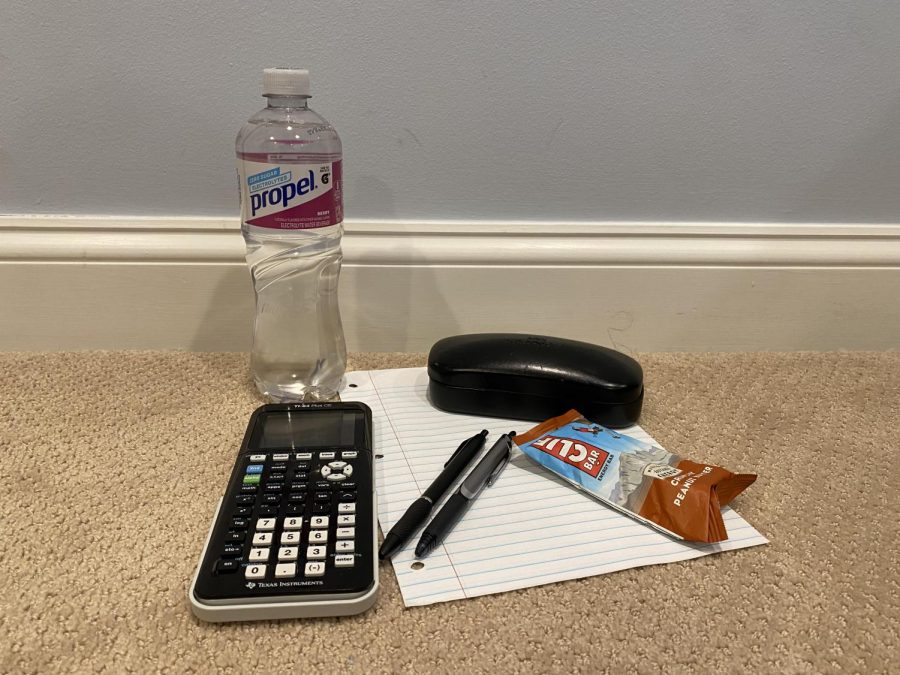Use this toolkit to prepare for AP exams
Laying out everything one will need for their AP test such as a drink, calculator, pens and a snack, the night before is an easy way to mitigate test day stress.
April 17, 2022
Churning stomachs and quavering hands line the rows of the auditorium at 8 am and 12 pm during the first two weeks in May. After eight months of learning and studying, one exam determines if a student can receive college credit for their AP class.
Traditionally, AP exams are taken at the beginning of May in the WCHS auditorium with pen, paper and proctors peering over shoulders. However due to the COVID-19 related school closures and educational adaptations, only the Class of 2022 has had the opportunity to take an in-person exam, and most of them did not as freshmen in 2019.
In 2020 and 2021, exam takers were tested through a digital version taken in the familiarity of their own home. For an already difficult test, a new environment may add some more uncertainty, but letting stress and anxiety cripple you will only make you perform worse.
There are many keys to success for taking big tests such as an AP exam. Just as every person learns differently, every person tests differently, though, so the best keys are whichever work the best for you.
Review wrong answers
When studying for their AP exams many students take mock tests to get a feel for what questions may be about and the timing of the exam. In most cases, whether on AP Classroom or in a review book, after the test the correct answers are provided so that students can check their work. Doing this is a particularly important step in the studying process.
By discovering which questions they got wrong, and then reviewing why they got it wrong (did not know content, misread question, etc,) ensures a student will be able to focus on that specifically and not remake the same mistake.
Lay your bag out the night before
There is no need for added stress on exam day, so students should prepare everything they will need the day (or few) before. Students need to bring their own black or blue pens to the exam which they will use to complete the test, so it is a good idea to pick out pens you like ahead of time and test them the night before to make sure the ink is flowing.
For tests involving a calculator, checking your materials the night before gives a student time to charge their calculator, having it test ready. If a student prepares their bag with all the materials they will need including a snack and water, the morning of the test will operate as smoothly as possible.
Get a good night of sleep
The night before an exam is not a great night to go to a party or have a movie marathon. In order to focus during your exam it is important to be alert and engaged, which requires as little drowsiness as possible. Try to go to sleep as early as you can the night before, so do not partake in a late night cram session. Studying that close to the test will have significantly more negative effects than positive. Very little information will be retained at that point and not only will you be tired from lack of sleep, but you will also be tired of the content and materials. Also, make sure to set two alarms so that you do not oversleep and miss your exam!
Eat breakfast
Midway through a math problem is not the time for your stomach to growl. Few things are more distracting while taking a test than hunger. In order for your brain to be firing as well as it can, it is important that your body is properly nourished.
Skipping a meal before your test can cause the testtaker to feel preoccupied by their stomach, but eating the wrong kind of foods can also be an issue. Students should choose a breakfast that they know keeps them full for a while and one that includes multiple food groups. Protein is especially important for continued energy. A super sugary breakfast is not the best option, since that can cause a crash in energy once it wears off.
Move on when you get stuck
AP exams are usually used to gain college credit on that specific course, so naturally they are very difficult tests. In addition to the hard questions, students are under a time crunch, further complicating the exam. In order for a student to demonstrate their full knowledge and complete the exam, it is necessary that once they realize they do not know the answer they move on.
During multiple choice question sections, once the student has eliminated answers that they believe are incorrect, guessing and then moving on is the best option. Guessing only gives test takers a 25% chance of marking the correct answer and if they spend all their time thinking about it they may not even reach a question that they easily knew the answer to. Given there is such a large curve on the exams, it is OK if some answers are wrong. Students should not be concerned that a question may be answered incorrectly, once they choose an answer they should let themselves fully move on to the next question – there may even be time remaining at the end to double check answers!
AP exams are often a time when students get overwhelmed and brains get fried. The most important key to success is for test takers to take a deep breath and be confident in themselves and their knowledge. After dedication to their learning and months of preparation, exams are a time to show all they know. Once a student finishes an exam, the best tip is to be proud no matter how they think it went and breathe a sigh of relief.



